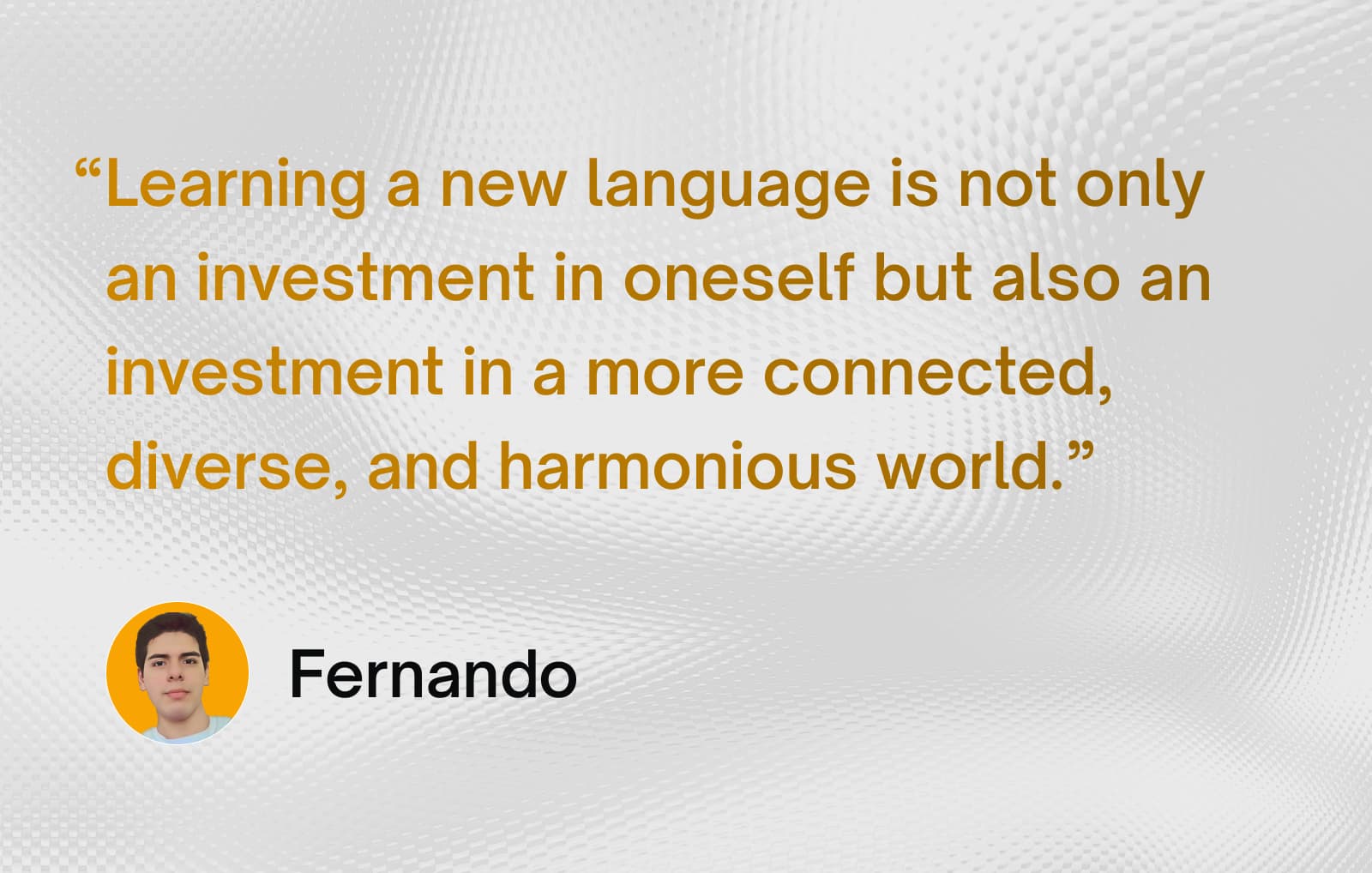Breaking down language barriers: Learning a new language in today's multicultural society

In our increasingly interconnected and multicultural world, the ability to communicate across language barriers has become more important than ever. Learning a new language opens doors to new experiences, opportunities, and friendships and fosters a deeper understanding of diverse cultures and perspectives.
In this interview with Fernando, a passionate Spanish teacher, we explore the benefits of learning a new language and highlight the role of learning a language in fostering cultural understanding and inclusivity.
The value of learning a new language

Learning a new language has numerous advantages, from personal to professional growth. Language learning fosters empathy, curiosity, and open-mindedness, which are essential qualities in today's diverse and globalized society. Additionally, bilingual or multilingual individuals often have an edge in the job market, as employers increasingly value cross-cultural communication skills and the ability to navigate diverse work environments.
Mastering a new language allows you to connect with people from different backgrounds, access a wealth of knowledge, and develop your cognitive abilities.
Learning a language can be a good perk

Language learning can benefit individuals from all walks of life from:
Students: Learning a new language can boost academic performance and expand future educational and career opportunities. It also encourages students to develop a global perspective and appreciation for diversity.
Professionals: In today's global economy, professionals who can communicate effectively in multiple languages have a competitive edge. Language skills can lead to international job opportunities, collaboration with diverse teams, and the ability to serve clients from different cultural backgrounds better.
People who like to travel for work, school, or pleasure: Knowing the local language can significantly enhance your travel experience by allowing you to connect with locals, navigate unfamiliar environments, and gain a deeper understanding of the culture.
Lifelong learning: Language learning can be a fulfilling and intellectually stimulating pursuit at any age. It helps to keep the mind sharp, promotes personal growth, and fosters a sense of achievement.
Practical tips and strategies for language learners

Effective language learning requires a combination of motivation, consistency, and engaging learning methods. Here are some practical tips for mastering a new language:
Work towards a goal-achieving game plan
The SMART goals technique also works well here. Establish specific, measurable, achievable, relevant, and time-bound (SMART) language learning goals to stay focused and motivated.
Create a consistent routine
Dedicate time each day to practice and immerse yourself in the language. Consistency is key to retaining and building upon your language skills.
Find fun in the learning process
Engage with the language through activities you enjoy, such as watching movies, listening to music, or reading books in the target language.
Resist the urge to compare yourself to others
Avoiding comparisons is important, especially if you are a member of a language learning group; it is imperative to remember that we all have our own pace of processing and internalizing information.
Just because it takes you longer does not mean it will be impossible. Small accomplishments make a difference. "Keep the saw sharp and validate your achievements."
Practice makes perfect
Practice speaking at every opportunity you get. Find a language exchange partner, join a conversation group, or attend language meetups to practice speaking and build confidence.
Use technology to your advantage
Utilize language learning apps, online courses, and other digital resources to enhance your learning experience.
Perseverance and patience will pay off
It's normal to encounter challenges and setbacks but don't let them discourage you. Remember that language learning is a lifelong journey.
How to promote cultural understanding and inclusivity through language learning

Learning a language goes beyond just mastering words and pronunciation; it also opens up a world of knowledge about different cultures, histories, and values. Some people start learning a new language because of the influence of entertainment. They are curious to understand what certain words of their favorite show or song mean and try to imitate their pronunciation. These attempts open a new window of discovery and deconstruction of information that we have learned and reproduced for many years, and that was not necessarily true.
This understanding helps challenge stereotypes and promotes inclusivity in our multicultural society, allowing us to build bridges across cultural divides
This new way of seeing the world allows the construction of allies to mitigate and reduce the phrases and actions of exclusion because when humans do not understand certain cultural practices that are not part of our daily lives, we tend to foster preconceptions and stereotypes that continue to fragment human relationships. Being open to learning about the worldview of other cultures allows us to introspect and be aware, which is fundamental to fostering human relationships based on positive values.
Additionally, as learners, we have to consider that many of our everyday expressions in our native languages do not follow the literal conceptual definition, but rather that due to the historical relationship between human beings and nature, these expressions have developed other meanings that are related to the worldview of society and how they construct their forms of communication.
By fostering empathy and open-mindedness, language learning can contribute to a more inclusive and harmonious society where individuals from diverse backgrounds can connect, collaborate, and learn from one another.
Language is a powerful tool for social cohesion and fostering mutual respect.
Furthermore, language learning can help dispel the notion of a monolithic culture within a language group. As learners delve deeper into a language, they often discover the rich tapestry of regional dialects, customs, and traditions that make up the diverse cultural landscape of a language community. This understanding can foster a greater appreciation for different cultures' unique and varied aspects.
At the end of the day
Learning a new language is a valuable skill that can enhance your personal, professional, and societal life. It enables you to engage with people from different cultures, obtain new employment opportunities, and foster cultural empathy and acceptance.

Whether you're studying in school, working in a field, exploring new countries, or just passionate about learning, language can help you overcome barriers, build strong connections, and contribute to a more compassionate world. In the wise words of Nelson Mandela, speaking someone's language is a powerful way to connect not just with their head but also with their heart.
Thank you, Fernando, for sharing your insights and supporting Workee!
Connect and learn more about Fernando on his website.


